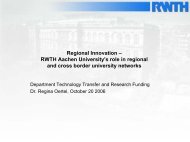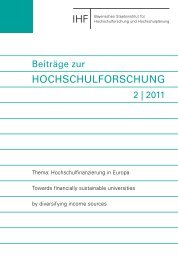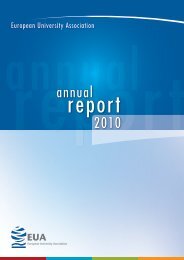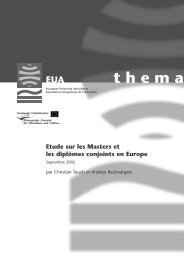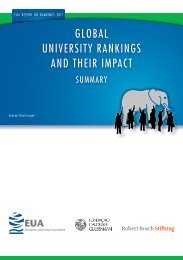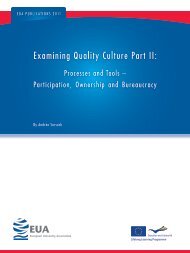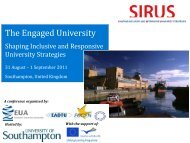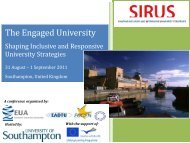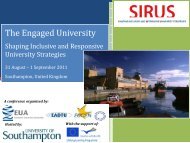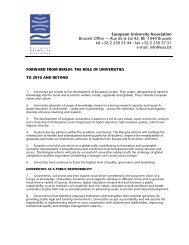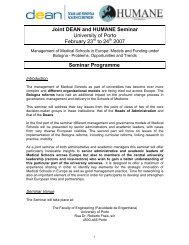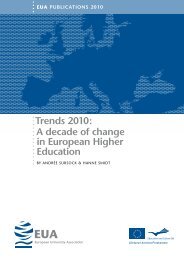17535/08 - European University Association
17535/08 - European University Association
17535/08 - European University Association
Create successful ePaper yourself
Turn your PDF publications into a flip-book with our unique Google optimized e-Paper software.
COUCIL OF<br />
THE EUROPEA UIO<br />
Brussels, 19 December 20<strong>08</strong><br />
<strong>17535</strong>/<strong>08</strong><br />
EDUC 291<br />
SOC 806<br />
MI 568<br />
COMPET 589<br />
COVER OTE<br />
from: Secretary-General of the <strong>European</strong> Commission,<br />
signed by Mr Jordi AYET PUIGARNAU, Director<br />
date of receipt: 19 December 20<strong>08</strong><br />
to: Mr Javier SOLANA, Secretary-General/High Representative<br />
Subject: Communication from the Commission to the <strong>European</strong> Parliament, the<br />
Council, the <strong>European</strong> economic and social Committee and the Committee of<br />
the regions<br />
"An updated strategic framework for <strong>European</strong> cooperation in education and<br />
training"<br />
Delegations will find attached Commission document COM(20<strong>08</strong>) 865 final.<br />
Encl.: COM(20<strong>08</strong>) 865 final<br />
________________________<br />
<strong>17535</strong>/<strong>08</strong> GN/ag 1<br />
DGI - 2B E
COMMISSION OF THE EUROPEAN COMMUNITIES<br />
Brussels, 16.12.20<strong>08</strong><br />
COM(20<strong>08</strong>) 865 final<br />
COMMUICATIO FROM THE COMMISSIO TO THE EUROPEA<br />
PARLIAMET, THE COUCIL, THE EUROPEA ECOOMIC AD SOCIAL<br />
COMMITTEE AD THE COMMITTEE OF THE REGIOS<br />
An updated strategic framework for <strong>European</strong> cooperation in education and training<br />
{SEC(20<strong>08</strong>) 3047}<br />
{SEC(20<strong>08</strong>) 3048}<br />
EN EN
COMMUICATIO FROM THE COMMISSIO TO THE EUROPEA<br />
PARLIAMET, THE COUCIL, THE EUROPEA ECOOMIC AD SOCIAL<br />
COMMITTEE AD THE COMMITTEE OF THE REGIOS<br />
An updated strategic framework for <strong>European</strong> cooperation in education and training<br />
1. ITRODUCTIO<br />
(Text with EEA relevance)<br />
Building higher skills through better education and training systems is an essential<br />
part of Europe's strategy to meet future challenges such as the ageing of society and<br />
to deliver the high levels of sustainable, knowledge-based growth and jobs that are at<br />
the heart of the Lisbon strategy. Knowledge, skills and competences determine an<br />
individual's chances to succeed in the labour market and to have an active role in<br />
society. They are crucial for social cohesion as well as the competitiveness and<br />
innovative capacity of enterprises and the entire economy.<br />
As set out in the initiative on ew Skills for ew Jobs, also published with this year's<br />
Lisbon package, labour market changes will require both upgrading the skills of the<br />
population and skills development policies that better match current and future<br />
labour market needs. This will only happen if lifelong learning becomes a reality, not<br />
a slogan, allowing people to acquire key competences early and update skills<br />
throughout their lives; and if education and training systems become more responsive<br />
to change and more open to the wider world.<br />
EU Member States and the Commission have been cooperating closely to support<br />
national reforms of education and training systems through the "Education &<br />
Training 2010" work programme. While taking into account Member States’ very<br />
different starting points, the open method of coordination (OMC) has supported<br />
progress towards a set of shared objectives measured against common indicators and<br />
benchmarks and in line with the integrated guidelines for growth and jobs, aimed at<br />
increasing investment in human capital through better education and skills,<br />
facilitating innovation, and promoting a more entrepreneurial culture 1 . The current<br />
framework for cooperation, which was agreed by the Education Council in 2001/02,<br />
is coming to an end and this is an appropriate point to take stock and look ahead.<br />
Following a wide consultation with Member States and other actors during 20<strong>08</strong>, this<br />
Communication suggests long-term strategic challenges to guide the policy<br />
cooperation for the period to 2020. The challenges reflect the contribution of<br />
education and training to the Lisbon Strategy and the renewed Social Agenda. The<br />
Communication also outlines the most urgent priorities which merit particular<br />
attention during the initial period ahead, for 2009 and 2010. This, together with<br />
improved working methods, will strengthen the focus on implementation and make<br />
the new framework more flexible to address both certain long-identified weaknesses<br />
1 Guidelines 23, 24, 8, 15.<br />
EN 2 EN
and to open policy cooperation on new challenges. It also includes the possibility to<br />
refocus later, in the light of progress made, to reflect new issues as they emerge in<br />
the policy dialogue and to adapt objectives, benchmarks and reporting mechanisms<br />
as necessary in the light of decisions that will be taken on the future Growth and Jobs<br />
strategy beyond 2010.<br />
At this time when the EU is seeking to minimise the impact of the current economic<br />
downturn and set the course for renewed growth, it is vital that the momentum in<br />
favour of educational investment that is both efficient and equitable is maintained.<br />
Good policies will simultaneously aid recovery from recent shocks and build the<br />
basis for meeting future challenges with confidence.<br />
2. WHERE DO WE STAD?<br />
2.1. Progress and challenges<br />
Responsibility for education and training policy lies with Member States. Europe’s<br />
role is to support the improvement of national systems through complementary EUlevel<br />
tools, mutual learning and exchange of good practice.<br />
Policy cooperation on education and training has supported national reforms of<br />
lifelong learning and qualification systems, the modernisation of higher education<br />
and the development of <strong>European</strong> instruments promoting quality, transparency of<br />
qualifications and mobility in learning. But progress varies considerably between<br />
Member States and is insufficient in key areas. Implementation therefore needs to be<br />
strengthened. As shown in chart 1, most of the benchmarks that the Council set for<br />
2010 will not be reached. While the maths, science and technology benchmark was<br />
reached in 2003, progress on early-school leaving, upper-secondary attainment and<br />
adult participation in lifelong learning is insufficient to reach the targets.<br />
Performance on low achievers in reading literacy has even deteriorated 2 .<br />
The 20<strong>08</strong> Spring <strong>European</strong> Council therefore urged Member States to take concrete<br />
action to reduce substantially the number of people who cannot read properly and the<br />
number of early school leavers, to improve the achievement levels of learners with a<br />
migrant background or from disadvantaged groups, to attract more adults into<br />
continuing education and training and to further facilitate geographic and<br />
occupational mobility 3 .<br />
2 OJ C 86, 5.4.20<strong>08</strong>, p. 1; SEC(20<strong>08</strong>) 2293.<br />
3 <strong>European</strong> Council Conclusions March 20<strong>08</strong>, para. 15.<br />
EN 3 EN
Chart 1: Progress towards meeting the 5 benchmarks for 2010 (EU average) 4<br />
2010 benchmarks = 100<br />
200<br />
190<br />
180<br />
170<br />
160<br />
150<br />
140<br />
130<br />
120<br />
110<br />
100<br />
90<br />
80<br />
70<br />
60<br />
50<br />
40<br />
30<br />
20<br />
10<br />
0<br />
-10<br />
-20<br />
-30<br />
-40<br />
-50<br />
-60<br />
-70<br />
-80<br />
Progress towards meeting the 5 benchmarks (EU average)<br />
2000 2001 2002 2003 2004 2005 2006 2007 20<strong>08</strong> 2009 2010<br />
(below 0 = performance<br />
getting worse)<br />
EN 4 EN<br />
Year<br />
MST graduates<br />
progress required<br />
Lifelong learning participation<br />
Early school leavers<br />
Upper secondary completion<br />
Low achievers in reading<br />
2.2. <strong>European</strong> education and training systems in a worldwide perspective<br />
Seen in a wider perspective, the EU's education and training performance is broadly<br />
comparable with the best in the world. But comparisons with other OECD countries<br />
reveal significant backlogs for the EU, both at the level of basic schooling and in<br />
higher education.<br />
Most notably, PISA results for reading literacy (15-year-olds) show that the EU as a<br />
whole has an increasing share of low performers. Chart 2 shows that the share in<br />
South Korea, Canada and Australia is relatively stable and far below the EU average.<br />
Migrant populations – which perform badly on this indicator within the EU 5 –<br />
succeed notably better in Canada and Australia. Chart 3 shows that some EU<br />
Member States perform at a level comparable to the best in the world. But given the<br />
poor performance of some other Member States, this remains a substantial,<br />
<strong>European</strong>-level challenge.<br />
4 Latest data for MST graduates, low achievers in reading: 2006. Others: 2007.<br />
5 COM(20<strong>08</strong>) 423.
Chart 2: Low achievers in reading (at age 15) on the PISA reading literacy scale in<br />
the EU and selected third countries 2000 and 2006 (Data source: OECD)<br />
EU<br />
Japan<br />
USA<br />
Korea<br />
Canada<br />
Australia<br />
5,8<br />
5,7<br />
9,6<br />
10,1<br />
11<br />
EN 5 EN<br />
12,4<br />
13,4<br />
Benchmark 2010<br />
0 5 10 15 20 25 30<br />
Chart 3: Low achievers in reading (at age 15) on the PISA reading literacy scale in<br />
the EU 2000 and 2006 (Data source: OECD)<br />
17<br />
18,4<br />
17,9<br />
2000 2006<br />
Secondly, many of the EU's key competitors have higher shares of people with<br />
tertiary level educational attainment. The EU average for 25-64 years old is 23%<br />
compared to 40% for Japan, 39% for the USA, 32% for Australia and Korea and<br />
27% for New Zealand.<br />
Finally, while ensuring the efficiency of investments is a key concern for the EU,<br />
many countries outside Europe are investing significantly more in higher education,<br />
19,4<br />
21,3<br />
24,1<br />
2006<br />
2003<br />
2000
in particular from private sources. Private investment (0.23% of GDP in the EU) is<br />
much higher in both Japan (0.76%) and the USA (1.91%) 6 .<br />
These comparisons show that if Europe is to succeed in its ambition to be the world's<br />
leading knowledge economy and society, it must step up its performance in these<br />
areas.<br />
3. LOG-TERM STRATEGIC CHALLEGES AD IMMEDIATE PRIORITIES: RAISIG<br />
SKILLS LEVELS THROUGH LIFELOG LEARIG<br />
On the basis of its consultations, the Commission proposes that <strong>European</strong><br />
cooperation in education and training should address four strategic challenges in the<br />
years to 2020:<br />
• Make lifelong learning and learner mobility a reality;<br />
• Improve the quality and efficiency of provision and outcomes;<br />
• Promote equity and active citizenship;<br />
• Enhance innovation and creativity, including entrepreneurship, at all levels of<br />
education and training.<br />
These challenges should be addressed in a joined-up policy across the systems as a<br />
whole (schools, higher education, vocational education and training/VET and adult<br />
learning). Lifelong learning is therefore a fundamental perspective underpinning all<br />
the above challenges.<br />
While these strategic challenges should form the basis for policy cooperation for the<br />
period 2009-2020, more specific objectives should be established for priority<br />
attention in shorter term blocks. The following sections 3.1 to 3.4 set out the long<br />
term strategic challenges in more detail and propose relevant priorities for the first<br />
period, 2009-2010.<br />
3.1. Strategic challenge: Make lifelong learning and learner mobility a reality<br />
Lifelong learning comprises learning at all ages (from pre-primary to post–<br />
retirement) and in all contexts, i.e. including formal, non-formal or informal settings.<br />
Member States agreed to put in place by 2006 coherent and comprehensive national<br />
lifelong learning strategies.<br />
Implementing such strategies remains a challenge. Progress has been made as a result<br />
of the <strong>European</strong> Qualifications Framework (EQF) 7 which triggered development<br />
work on national qualification frameworks in many countries, including a new focus<br />
on learning outcomes (i.e. on what a learner knows, understands and is able to do<br />
rather than the learning process itself). By increasing the transparency of<br />
6 SEC(20<strong>08</strong>) 2293, pp. 69, 89, 148.<br />
7 OJ C 111, 6.5.20<strong>08</strong>, p. 1.<br />
EN 6 EN
qualifications, the EQF will facilitate the mobility of learners and workers between<br />
countries and their access to lifelong learning.<br />
However, much remains to be done to establish flexible learning pathways, e.g.<br />
through better transitions between VET and higher education, opening universities to<br />
non-traditional learners or the validation of non-formal learning. Learning must be<br />
attractive and accessible for all citizens, independent of age, educational attainment,<br />
employment or social status. Better coordination between different education and<br />
training sectors, institutional commitment (including sustainable models of funding)<br />
and partnership with all stakeholders is required.<br />
Learner mobility between countries is an essential element of lifelong learning and<br />
for building people's employability and adaptability. Evaluations of the EU<br />
programmes show that mobility breaks down barriers between people and groups,<br />
makes the benefit of <strong>European</strong> citizenship more tangible and helps people become<br />
more adaptable and open to mobility when they enter the labour market. Crossborder<br />
learner mobility should become the norm, rather than the exception that it is<br />
today. A new commitment of all actors, together with more broadly-based funding<br />
will be required to achieve this.<br />
Priority themes to be highlighted in 2009-10:<br />
Member States and the Commission should give priority to achieving better<br />
implementation of<br />
• Lifelong learning strategies: Complete the process of implementation of national<br />
lifelong learning strategies, giving particular attention to the validation of nonformal<br />
and informal learning and guidance.<br />
• <strong>European</strong> Qualifications Framework: Link all national qualifications systems<br />
to the EQF by 2010 and support the use of an approach based on learning<br />
outcomes for standards and qualifications, assessment and validation procedures,<br />
credit transfer, curricula and quality assurance.<br />
Member States and the Commission should focus on developing the policy<br />
cooperation on<br />
• Expanding learning mobility: Work together to eliminate barriers and expand<br />
opportunities for learning mobility within Europe and worldwide, both for higher<br />
and other levels of education, including new targets and financing instruments at<br />
the <strong>European</strong> and national levels 8 .<br />
3.2. Strategic challenge: Improve the quality and efficiency of provision and<br />
outcomes<br />
The <strong>European</strong> Council has frequently stressed that high quality education and<br />
training systems which are both efficient and equitable are crucial for Europe's<br />
success.<br />
8 Council Conclusions of 20/21.11.20<strong>08</strong> on youth mobility.<br />
EN 7 EN
The major challenge is to ensure the acquisition of key competences 9 by everyone,<br />
while developing the excellence that will allow Europe to retain a strong global role<br />
in higher education. Learning outcomes at all levels must be relevant for professional<br />
and private life.<br />
The quality of teachers, trainers and other educational staff is the most important<br />
within-school factor affecting student performance 10 . With around two million older<br />
teachers to be replaced in the next 15 years, the teaching profession must become a<br />
more attractive career choice 11 .<br />
To provide high quality outcomes on a sustainable basis, the governance of education<br />
and training systems must also be addressed. Education and training institutions<br />
should be given greater autonomy, should be more open to the civil society and<br />
enterprises and should be subject to effective systems of quality assurance.<br />
High quality will only be achieved with an efficient and sustainable use of resources.<br />
The case for investment in education and training as a factor essential for economic<br />
growth and social inclusion should be strengthened by developing the evidence<br />
base 12 .<br />
Priority themes to be highlighted in 2009-10<br />
Member States and the Commission should give priority to achieving better<br />
implementation in the following fields<br />
• Languages: To enable citizens to communicate in two languages in addition to<br />
their mother tongue, promote language teaching in VET and for adult learners and<br />
give migrants the opportunity to learn the language of the host country 13 .<br />
• Professional development of teachers and trainers: Focus on key elements of<br />
teachers' initial training and on expanding the range and quality of the continuing<br />
professional development opportunities for teachers, trainers and staff involved,<br />
for example, in leadership or guidance activities.<br />
• Governance and funding: Implement the modernisation agenda for higher<br />
education (including curricula) 14 , the quality assurance framework for VET 15 and<br />
develop standards for adult learning professionals. Promote evidence-based policy<br />
and practice, 16 with a particular emphasis on establishing the case for<br />
sustainability of public and private investment.<br />
9 OJ L 394, 30.12.2006, p. 10.<br />
10 COM(2007) 392.<br />
11 Council Conclusions of 15 November 2007, OJ C 300, 12.12.2007, p. 6.<br />
12 COM(2006) 481.<br />
13 COM(20<strong>08</strong>) 566.<br />
14 COM(2006) 2<strong>08</strong>.<br />
15 COM(20<strong>08</strong>) 179.<br />
16 SEC(2007) 1098.<br />
EN 8 EN
Member States and the Commission should focus on developing the policy<br />
cooperation on<br />
• Basic skills in reading, mathematics and science: Set up a high-level group on<br />
literacy to investigate the problems behind the decline in reading performance<br />
among school pupils 17 and make recommendations to improve literacy levels<br />
across the EU. Intensify existing cooperation to improve the take-up of maths and<br />
science at higher levels of education and training, and to strengthen science<br />
teaching. Member States should consider establishing national action plans for<br />
achievement in basic skills, including for adults.<br />
• "ew Skills for ew Jobs": Ensure that the assessment of future skill<br />
requirements and the matching of labour market needs are fully taken on board in<br />
all education and training planning processes.<br />
3.3. Strategic challenge: Promote equity and active citizenship<br />
Education and training policy should enable all citizens, irrespective of age, gender<br />
and socio-economic background, to acquire, update and develop over a lifetime both<br />
job-specific skills and the key competences needed to foster further learning, active<br />
citizenship and intercultural dialogue.<br />
Despite the fact that questions of equity have been central to the OMC on Education<br />
and Training from the outset, the main, central challenges remain. Every sixth young<br />
person still leaves school with only compulsory education attainment level or below.<br />
Many learners with a migrant background succeed less well in education and training<br />
than their native peers. While boys drop out of school more often and perform less<br />
well in reading, women are underrepresented among graduates in maths, science and<br />
technology. Adults with low education attainment are seven times less likely to be<br />
engaged in continuing education and training than those with high attainment levels.<br />
A learner's socio-economic background still has an important impact on his/her<br />
chances to access and succeed in education and training at whatever level 18 . These<br />
are major challenges which need to be addressed to promote social inclusion and to<br />
overcome bottlenecks in labour supply.<br />
Educational disadvantage can be addressed by high quality pre-primary education<br />
and targeted support, which must be combined with properly-managed inclusion in<br />
mainstream education and training.<br />
Education should promote intercultural skills, democratic values, the respect of<br />
fundamental rights and the fight against discrimination, equipping all young people<br />
to interact positively with their peers from diverse backgrounds.<br />
17 SEC(20<strong>08</strong>) 2293.<br />
18 SEC(20<strong>08</strong>) 2293.<br />
EN 9 EN
Priority themes to be highlighted in 2009-10<br />
Member States and the Commission should give priority to achieving better results in<br />
• Early school leaving: Strengthen preventive approaches, build closer cooperation<br />
between general and vocational sectors and remove barriers for drop-outs to return<br />
to education and training.<br />
Member States and the Commission should focus on developing the policy<br />
cooperation on<br />
• Pre-primary education: Promote generalised equitable access and reinforce<br />
quality of provision and teacher support.<br />
• Migrants: Develop mutual learning on best practices for education of children<br />
from a migrant background 19 .<br />
• Learners with special needs: Promote personalised learning through timely<br />
support and well coordinated services. Integrate services within mainstream<br />
schooling and ensure pathways to further education and training.<br />
3.4. Strategic challenge: Enhance innovation and creativity, including<br />
entrepreneurship, at all levels of education and training<br />
Innovation and creativity are key factors in enterprise development and crucial to<br />
Europe's ability to face the challenges of international competition and sustainable<br />
development.<br />
A first challenge is to ensure that all citizens can acquire transversal key<br />
competences such as learning-to-learn and communication skills, a sense of initiative<br />
and entrepreneurship, digital competence (incl. media literacy 20 ), cultural awareness<br />
and expression 21 . These and the use of new technologies – Member States should<br />
aim to make high-speed internet available to all schools by 2010 22 – must be<br />
reflected in curricula, pedagogies and qualifications. Enhanced university-business<br />
cooperation will stimulate entrepreneurial mindsets among students and researchers.<br />
The second challenge is to ensure a fully functioning knowledge triangle of<br />
education-research-innovation. The <strong>European</strong> Institute of Innovation and Technology<br />
can inspire and drive change to achieve excellence in teaching and research, in<br />
particular by encouraging multi-disciplinarity, partnerships between education<br />
institutions and business. Partnership between the world of enterprise and different<br />
levels and sectors of education, training and research can help to ensure a better<br />
focus on the skills and competences required in the labour market and on fostering<br />
innovation and entrepreneurship in all forms of learning. The creation of a <strong>European</strong><br />
19 COM(20<strong>08</strong>) 423.<br />
20 COM(2007) 833.<br />
21 OJ L 394, 30.12.2006, p. 10.<br />
22 <strong>European</strong> Council conclusions March 20<strong>08</strong>, para. 7; see also SEC(20<strong>08</strong>) 2629 and COM(2007) 833 on<br />
media literacy.<br />
EN 10 EN
Research Area and a landscape of world-class clusters should facilitate many such<br />
partnerships.<br />
The <strong>European</strong> Year of Creativity and Innovation 2009 will help to address some of<br />
the key challenges. In the context of developing the policy cooperation, research,<br />
analysis and the exchange of ideas on how to measure creative and innovative skills<br />
needs to be promoted at EU level and with the relevant international organisations.<br />
Priority themes to be highlighted in 2009-10<br />
Member States and the Commission should give priority to achieving better<br />
implementation of<br />
• Transversal key competences: Integrate transversal key competences fully into<br />
curricula, assessment and qualifications 23 .<br />
Member States and the Commission should focus on developing the policy<br />
cooperation on<br />
• Innovation-friendly institutions: Promote creativity and innovation through<br />
developing specific teaching and learning methods (including the use of new ICT<br />
tools and teacher training).<br />
• Partnership: Develop partnerships between education and training providers and<br />
businesses, research institutions, cultural actors and creative industries.<br />
4. IMPROVED WORKIG METHODS FOR THE FUTURE OPE METHOD OF<br />
COORDIATIO<br />
The success of the open method of coordination in education and training depends on<br />
political commitment and on its capacity to support and have a real impact on<br />
national reforms. The policy cooperation should be relevant and concrete, should<br />
produce visible results and reach stakeholders and policy makers, including at the<br />
highest political level. Measuring progress towards agreed objectives is key.<br />
4.1. Governance and partnership<br />
The lifelong learning perspective calls for coordination and priority setting across<br />
different education and training sectors. Specific policy agendas have been set out for<br />
schools 24 , VET 25 , higher 26 and adult education 27 . Policy exchange and<br />
implementation work in all sectors must contribute to overall strategic priorities.<br />
To this end, the role of the existing informal high level group on education and<br />
training policy should be reinforced, to allow it to play a strategic role in steering the<br />
23 OJ L 394, 30.12.2006, p. 10.<br />
24 COM(20<strong>08</strong>) 425.<br />
25 Council Conclusions on the future priorities for enhanced <strong>European</strong> cooperation on Vocational<br />
Education Training (VET) of 20/21 November 20<strong>08</strong>.<br />
26 COM(2006) 2<strong>08</strong> and the intergovernmental Bologna process.<br />
27 COM(2006) 614; COM(2007) 558.<br />
EN 11 EN
OMC by: identifying priorities and monitoring the progress of work across all<br />
sectors; preparing inputs for policy discussions in the Education Council, for<br />
example, based on peer learning or review activities; and by ensuring that the policy<br />
cooperation on education and training is given due account both in the wider Lisbon<br />
process and in national policies.<br />
Priority should also be given to a greater involvement of stakeholders and social and<br />
civil society partners, who have a considerable contribution to make both in the<br />
policy dialogue and in implementation. The Commission will hold an annual forum<br />
with <strong>European</strong> stakeholder organisations and relevant stakeholders will be<br />
systematically involved in peer learning activities.<br />
4.2. Mutual learning, transfer of innovation and policy development<br />
Mutual learning is a central element of the OMC in education and training. It<br />
provides input for <strong>European</strong> policy initiatives and support to national policy<br />
development. And it is an important means for disseminating and implementing<br />
<strong>European</strong> tools and instruments, such as the <strong>European</strong> Qualifications Framework 28 or<br />
the recommendation on key competences for lifelong learning 29 .<br />
For the future, the aim should be to strengthen peer learning in order to ensure that it<br />
fully reflects the priority challenges identified above and to increase its impact at the<br />
political level. Activities need to be based on clear mandates, time-schedules and<br />
planned outputs (e.g. policy recommendations or handbooks, compendia of examples<br />
of best practice). It should be flexible enough to change and adapt to emerging issues<br />
and evolving policy themes. A rolling programme of peer learning and review based<br />
on the evolving policy priorities should be developed, starting with those defined for<br />
2009-10.<br />
In addition, the following instruments will also be used:<br />
• The Lifelong Learning Programme 30 will support the development, testing,<br />
transfer and implementation of new approaches and innovation.<br />
• Agencies such as Cedefop and the <strong>European</strong> Training Foundation, networks such<br />
as Eurydice, and expert groups 31 , including collaboration with the relevant<br />
international organisations, will support research and analysis.<br />
• The policy dialogue with several external partner countries can provide a wider<br />
comparative framework and fresh ideas: it should be reinforced and better linked<br />
to the OMC.<br />
28 OJ C 111, 6.5.20<strong>08</strong>, p. 1.<br />
29 OJ L 394, 30.12.2006, p. 10.<br />
30 OJ L 327, 24.11.2006, p. 45.<br />
31 This includes the Centre for Research on Education and Lifelong Learning (CRELL), the Institute for<br />
Prospective Technological Studies (IPTS) and the expert networks of economists and social scientists in<br />
education (EENEE, NESSE).<br />
EN 12 EN
4.3. Better reporting of progress and visibility<br />
The Commission and the Council currently issue a joint progress report every two<br />
years based on national reports from the Member States which chart their policy<br />
actions to address the OMC's overall objectives. Future reports should focus in<br />
greater detail on certain specific priorities for action. Thus, it is proposed that the<br />
next joint progress report, due for 2010, should focus on one or more of the<br />
immediate priorities highlighted in section 3. The joint reports should be further<br />
strengthened by including assessments of the situation in individual countries, which<br />
will in turn feed into the assessment of the education, training and skills components<br />
of the Lisbon National Reform Programmes. As of now, no change in the reporting<br />
rhythm – every 2 years – is proposed.<br />
Further efforts should be made to raise awareness, at the <strong>European</strong>, national and<br />
regional levels, of the support and opportunities provided by the open method of<br />
coordination in education and training, particularly its priorities and results. A<br />
website will provide information about policy initiatives and concrete examples of<br />
best practice identified in the context of the OMC.<br />
4.4. Indicators and benchmarks<br />
The existing five benchmarks<br />
The indicators and benchmarks developed in the context of the Education and<br />
Training 2010 work programme have proved to be useful in monitoring and<br />
communicating progress at the <strong>European</strong> level and in providing guidance for the<br />
identification of challenges. Three of these five benchmarks (on early school leavers,<br />
upper secondary attainment and adult participation in lifelong learning) form part of<br />
the integrated guidelines for growth and jobs.<br />
As shown in section 2.1, progress towards meeting the five benchmarks set for 2010<br />
has been insufficient. It is therefore important that efforts to improve performance in<br />
these areas are accelerated. To this end, Member States should adopt national targets<br />
in the areas where <strong>European</strong> benchmarks have been agreed.<br />
Updating the benchmarks beyond 2010<br />
For the period to 2020, policy cooperation should be supported by benchmarks which<br />
fully reflect the identified long term strategic challenges and which reflect a key<br />
aspect of the New Skills for New Jobs agenda - the need to upgrade skills and<br />
employability across the population as a whole. The future education and training<br />
benchmarks should also be sufficiently flexible to take account of the targets and<br />
indicators which will be used in the EU Strategy for Growth and Jobs beyond 2010–<br />
Lisbon post 2010. On this basis, it is proposed that the Commission and Member<br />
States should build on experience with the existing benchmarks and explore a new<br />
set of benchmarks along the following lines:<br />
• Review and where appropriate update the existing benchmarks, e.g. a possible<br />
extension of the benchmark on low achievers in reading skills to include also<br />
mathematics and science;<br />
EN 13 EN
• Incorporate into the benchmarks framework targets that were set by the Barcelona<br />
<strong>European</strong> Council of 2002 (i.e. on participation in pre-primary education and on<br />
access to early language teaching);<br />
• Introduce benchmarks building on themes which have emerged since the start of<br />
the cooperation or reflecting new political priorities e.g. in tertiary level<br />
attainment; learning mobility;<br />
• Launch development work to create new indicators on the link between education<br />
attainment and employability and on education for innovation and creativity,<br />
including entrepreneurship.<br />
Accordingly, the Commission would propose a debate with the Member States on the<br />
basis of the following possible benchmarks for the future OMC:<br />
4.4.1. Making lifelong learning and mobility a reality<br />
• Adult participation in lifelong learning: The existing benchmark foresees a<br />
participation rate of 12.5% of adults (aged 25-64) in lifelong learning. While there<br />
has been reasonable progress towards meeting this benchmark since 2002 (on<br />
current trends, the benchmark is likely to be achieved about 2017), it remains<br />
patchy and uneven between Member States. Given technological and<br />
demographic trends and the inevitable impact of the current economic downturn<br />
on jobs, it is even more urgent to upgrade and update the skills of adults.<br />
Consequently, the Commission would propose to raise the benchmark to<br />
participation of 15 % of adults in lifelong learning. It is important also that<br />
Member States should reduce the imbalance in participation between low and high<br />
skilled adults participation in lifelong learning; they should be invited to set<br />
national targets to do so.<br />
• Mobility: a new benchmark should be developed on the basis of the conclusions of<br />
the Education and Youth Council of November 20<strong>08</strong> which propose objectives for<br />
mobility of university students, school pupils, the vocational sector and teachers<br />
and trainers.<br />
4.4.2. Improving the quality and efficiency of provision and outcomes<br />
• Low achievers in basic skills: Following the 20<strong>08</strong> Spring <strong>European</strong> Council which<br />
urged Member States to take concrete action to tackle this problem, the<br />
Commission would propose a benchmark that the share of low-achieving 15-yearolds<br />
in basic skills (reading, mathematics and science) should be lower than 15%<br />
on average and that particular attention should be given to reducing gender<br />
imbalances. The aim would be to widen the scope of the previous literacy-only<br />
benchmark without raising the threshold.<br />
• Languages: The Commission would propose a new benchmark that at least 80%<br />
of pupils in lower secondary education should be taught at least two foreign<br />
languages. This proposal would seek to deliver on the demand of the Barcelona<br />
<strong>European</strong> Council to provide teaching in at least two foreign languages from an<br />
early age. There has recently been rapid growth in language teaching in early<br />
education. In 2000, 40% of pupils in early school education were receiving tuition<br />
EN 14 EN
in two foreign languages; by 2006 (most recent figures available), this had risen to<br />
52%. The aim would be to further stimulate this good progress.<br />
• Investment in higher education: The Commission would propose a new<br />
benchmark that public and private investment in modernised higher education<br />
should reach at least 2% of GDP 32 . This would reflect the policy discussions on<br />
modernising higher education since the Hampton Court Summit of 2005 and<br />
would seek to bring investment levels in higher education (currently 1.3% of GDP<br />
from public and private sources) closer to the levels of key competitors such as<br />
the US and Japan, whose investment (public and private) stands at 2.45%% and<br />
1.85% respectively.<br />
• Tertiary level attainment: The Commission would propose a new benchmark that<br />
the share of 30-34 year olds with high educational attainment should be at least<br />
45%. This proposal reflects the current upward trend in the share of 30-34 year<br />
olds with high educational attainment but would, as above, seek to encourage<br />
policies to bring EU performance (currently 30%) closer to the levels of key<br />
competitors such as the US and Japan (participation rates for the nearest<br />
comparable age group 25-34 are 39% and 54% respectively).The existing<br />
benchmark on the numbers of Maths, Science and Technology graduates has been<br />
reached and could be discontinued; however, the gender imbalance in such studies<br />
should continue to be monitored.<br />
• Employability: The Commission would propose to explore the development of a<br />
new benchmark linked to the labour market participation of people with different<br />
levels of educational attainment. Labour market success is strongly linked to a<br />
person's level of educational attainment and, as explained in the Commission's<br />
Communication on "New Skills for New Jobs", will be even more so in the future.<br />
This would have the aim of strengthening the contribution of education and<br />
training systems to the Lisbon agenda.<br />
4.4.3. Promoting equity and active citizenship<br />
• Pre-primary education: The Commission would propose a new benchmark at<br />
least 90% of young children should participate in pre-primary education (4 years<br />
old). The EU average rate of participation is already approaching 90%, but this<br />
overall high level of participation masks significant variations in national<br />
performance. This proposal would seek to support progress towards the demand<br />
of the Barcelona <strong>European</strong> Council that childcare be provided in respect of 90%<br />
of children.<br />
• Early school leavers: The Commission would propose to maintain unchanged the<br />
existing benchmark that not more than 10% of the population aged 18-24 should<br />
have only lower-secondary education and not be in education and training. The<br />
proposal to leave the benchmark unchanged reflects the fact that progress towards<br />
this mark, since its adoption in 2002, has been slow The Commission would hope<br />
for a stronger focus on the implementation of policies to make real progress<br />
towards this key benchmark. Reflecting this need to concentrate on<br />
32 COM(2005) 152.<br />
EN 15 EN
implementation, the closely linked benchmark on upper secondary completion<br />
could be discontinued.<br />
4.4.4. Enhancing innovation and creativity, including entrepreneurship, at all levels of<br />
education and training<br />
• Innovation and creativity: The Commission would propose to develop indicators<br />
and explore with Member States the feasibility of developing a benchmark to<br />
address how education systems promote innovation and creativity, including<br />
entrepreneurship. The exchanges to be undertaken during 2009, the <strong>European</strong><br />
Year of Creativity and Innovation, should help with the reflection on what is a<br />
very new area of policy exchange.<br />
5. COCLUSIOS<br />
Education and training policy remains crucial to achieving growth and jobs, social<br />
inclusion and active citizenship but continues to face important challenges. Progress<br />
on key educational issues such as literacy and early school leaving is slower than<br />
hoped. The current focus on the economic crisis must not divert attention from<br />
setting the right long-term, strategic education and training policies. As highlighted<br />
in this communication, Europe has to address a number of educational deficits if it is<br />
to avoid falling behind globally. For these reasons, there is, more than ever, a need<br />
for an effective open method of coordination supporting the improvement of<br />
education and training policies.<br />
The Commission calls upon the Council to endorse this proposed framework for the<br />
future <strong>European</strong> cooperation in education and training, the set of long-term strategic<br />
challenges until 2020 and priority issues for the period 2009-2010 and the proposed<br />
improved working methods.<br />
The framework should be reviewed and any necessary adjustments made in the light<br />
of the decisions taken on the EU Strategy for Growth and Jobs beyond 2010.<br />
EN 16 EN



